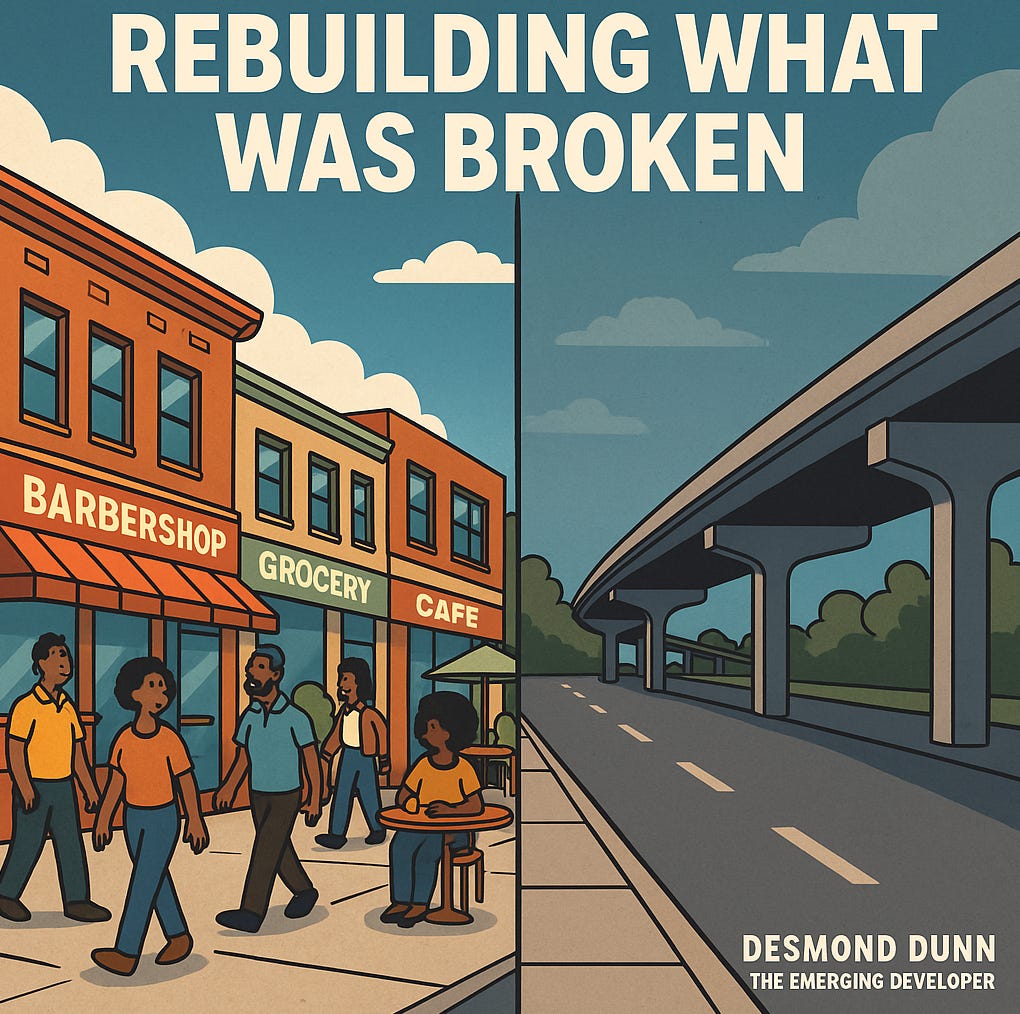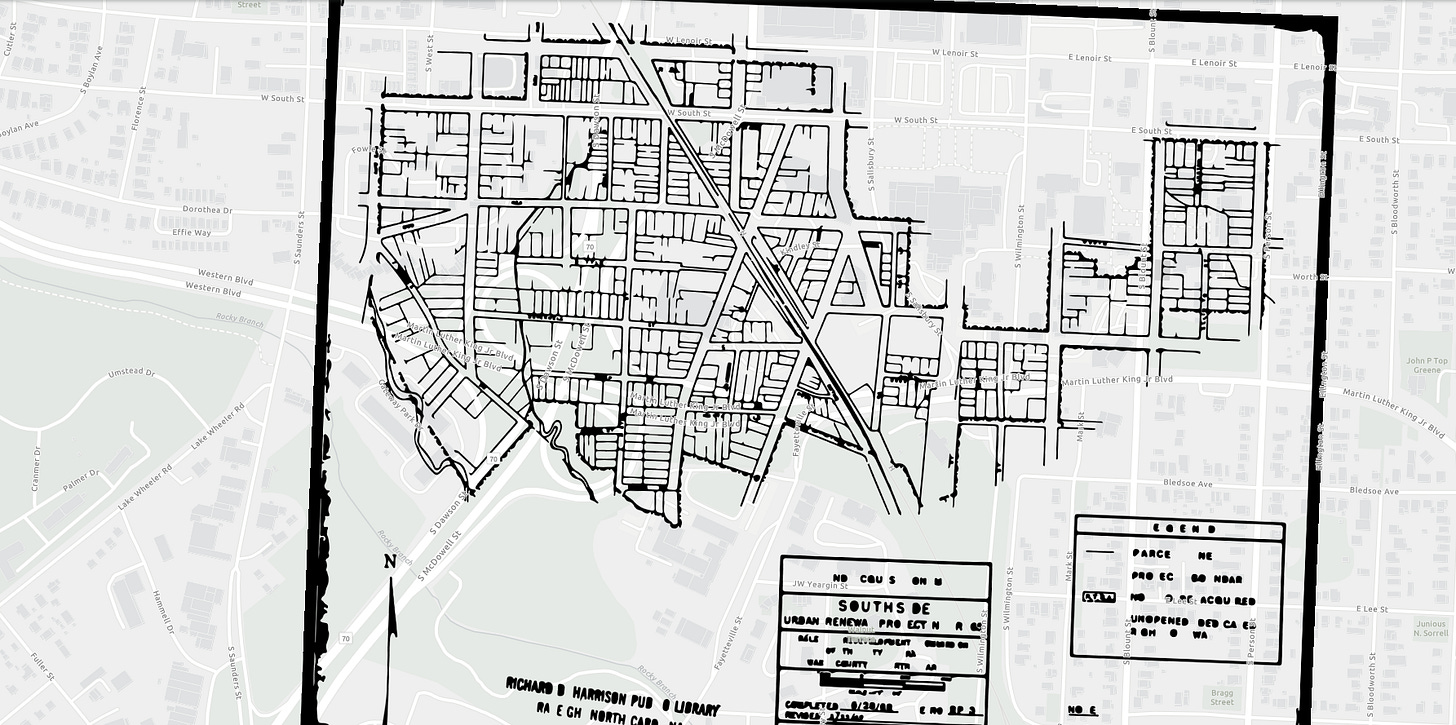If you walk through the pages of Raleigh’s history, you’ll find something striking: the city once had neighborhoods that embodied everything we now celebrate as “innovative urban design.”
In historically Black neighborhoods, daily life was within reach. You could walk to a barber shop, a grocery store, a church, a school, and often your job. The streets were alive with children playing, neighbors talking on porches, and businesses serving the community.
These weren’t luxury enclaves. They were resilient ecosystems. They were 15-minute cities before anyone used the term.
But they were broken. And not by accident.
The Break
The dismantling of these neighborhoods wasn’t natural decline — it was engineered.
Urban renewal programs in the mid-20th century bulldozed entire communities. Thriving areas like Smoky Hollow and parts of East Raleigh, as Carmen Wimberley Cauthen documents in Historic Black Neighborhoods of Raleigh, were labeled “blighted” and cleared away, often for projects that never delivered on their promises. Renewal became removal.
Redlining drew red lines across maps, cutting Black families off from mortgages and fair credit. Even when they owned property, their homes were undervalued, trapping them outside the wealth-building engine of equity.
Eminent domain and land seizures stripped families of assets that could have been passed down. Generational wealth was lost overnight.
Disinvestment followed. Banks left. Grocery stores closed. Infrastructure crumbled. Food deserts and financial deserts replaced once-thriving corridors.
What disappeared wasn’t just houses. It was wealth. It was identity. It was the connective tissue of community life.
Historical layout of the Fourth Ward District overlayed on its present location today.
-https://www.fourthwardhistory.org/virtual-tour
The Missed Lesson
Today, when we talk about affordable housing, too often the conversation stops at units and rent levels. How many apartments? At what AMI? What subsidy made the deal pencil out?
That’s important, but it’s not the whole story.
Housing stability matters. But without opportunity, stability hardens into stagnation. A unit may be affordable today, but what happens when a tenant is ready to grow, to buy a home, to start a business, to build wealth for the next generation?
Historically Black neighborhoods remind us that housing works best when it’s part of a larger ecosystem. One where work, culture, community, and opportunity are interwoven.
The Path Forward
If we want to rebuild what was broken, we need to stop thinking of affordable housing as an end point. It has to be a launchpad. That means:
Supporting Black-owned small businesses in and around developments
Expanding community land trusts that preserve affordability and build equity
Designing mixed-use, walkable places that connect housing with opportunity
Partnering with schools, workforce boards, and nonprofits to create ladders of mobility
Building policies that prevent displacement while encouraging reinvestment
It’s not enough to make rent affordable. We need to make futures possible.
Moving Forward
Raleigh has a chance to lead. Across the city, there’s a renewed energy for addressing housing, equity, and neighborhood resilience. But we can’t repeat the mistakes of the past, building new units while dismantling ecosystems of belonging.
What was broken can be rebuilt. Not the same as before, but stronger. Rooted in repair. Anchored in justice. Designed for wealth-building and belonging.
Because affordable housing should not just be about keeping a roof overhead. It should be about creating places where families can put down roots, thrive, and leave something behind for the next generation.
That is my life’s mission: not only to address affordable housing in historically Black communities, but to restore community, expand economic mobility, and rebuild thriving commercial corridors in parts of the city where resources have long been extracted. My work may be innovative and outside the box, but at its core it will always be restorative.
What’s one way you think Raleigh, or your city, can begin to rebuild not just housing, but true community wealth?




Yeah dude!!! Strong work. Solid mission. Here’s a mindbender the origin of the word individual: The root is individuus — meaning “indivisible, inseparable”🤔
I see that you have a free tier.
Awesome.